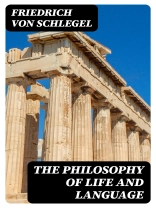Friedrich von Schlegel’s ‘The Philosophy of Life and Language’ presents a profound exploration of the interplay between existence and expression, intertwining philosophical inquiry with linguistic analysis. Schlegel employs a rich, Romantic literary style, illuminating how language shapes our understanding of the world and individual consciousness. Positioned within the broader context of German Idealism, the book argues for the intrinsic connection between life experiences, thought, and linguistic manifestation, offering insights that resonate with both contemporary philosophical discussions and poetic forms of expression. Friedrich von Schlegel, a pivotal figure in the early 19th-century German Romantic movement, was influenced by his varied experiences as a poet, critic, and philosopher. His exposure to the conflicts of personal identity and cultural transitions in post-Enlightenment Europe profoundly informed his views on language as a living entity that evolves with human experience. This background culminated in his desire to bridge the realms of art and philosophy, as reflected in this seminal work. For readers interested in the intersection of philosophy, linguistics, and Romantic literature, ‘The Philosophy of Life and Language’ is an essential read. Schlegel invites us to consider how our understanding of life is intimately linked to the language we use, making this book a vital contribution to the fields of philosophy and literary studies alike.
Yazar hakkında
Friedrich von Schlegel (1772-1829) was a notable German philosopher, critic, and poet who played a significant role during the Jena Romanticism movement. With a broad spectrum of intellectual interests ranging from literature and philosophy to linguistics and Oriental studies, Schlegel’s work influenced early German Romanticism profoundly. Particularly, his contributions to the development of literary theory and hermeneutics are well recognized. His seminal work ‘The Philosophy of Life and Language’ demonstrates his complex engagement with the intricate connections between linguistic structures and life itself, underscoring the philosophical underpinnings of human communication and expression. Schlegel’s literary style is characterized by its fragmentary nature, a hallmark of his approach to capturing the ineffable and evolving nature of philosophical thought. His other influential works such as ‘Lucinde’ and the essays collected in ‘Athenaeum’ showcase the breadth of his literary and critical talents, from novelistic experiments to incisive essays on art and culture. Beyond his own writings, Schlegel also played a critical role in promoting the works of other literary giants of his time, such as Goethe and Shakespeare. His endeavors in translating Shakespeare into German particularly attest to his commitment to intercultural dialogue and his belief in the universality of literary genius.












